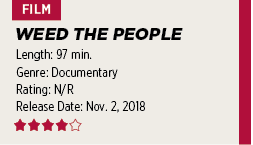REVIEW: ‘Weed the People’ is a compelling call for drug reform

In “Weed the People,” director Abby Epstein makes a case for increased research on medical marijuana by observing several families that resort to it for their children’s treatment. (Photo from IMDb)
 Documentaries have a two-fold function — to provide information and to keep their audiences engaged. Abby Epstein’s “Weed the People” fulfills both of these requirements.
Documentaries have a two-fold function — to provide information and to keep their audiences engaged. Abby Epstein’s “Weed the People” fulfills both of these requirements.
The documentary follows the lives of several families resorting to the use of medical marijuana for treatment as they desperately attempt to save their children’s lives. In relaying its core message, that marijuana use can alleviate the pain of life-threatening diseases, “Weed the People” is masterful.
Epstein uses the lives of several children, ranging from infants to high school seniors, to vilify the federal government and pharmaceutical corporations for hindering the progress made with cancer treatment.
At one point, the documentary appeared trite, comparable to YouTube conspiracy binge content, as a cast of accredited doctors and concerned parents question the disappearance of educational cannabis articles from government websites. The scene follows the same people raising suspicion over the United States’ hypocrisy of holding a patent over marijuana’s medical value.
One of the documentary’s main subjects is an infant named Sophie, whose parents chose cannabis-related treatments over traditional chemotherapy. Each of her health updates serves as dramatic high points that can either validate or invalidate the drug’s medical efficacy. As in real life, the children’s health updates generate the warmest of smiles and teariest of eyes, as modern medicine paired with the unknown power of cannabis both helps and fails some of the film’s young subjects.
The most thought-provoking moment in the documentary comes when a patient’s mother points out how “billions of dollars go into cancer research and here we are relying on medicine made in somebody’s kitchen.” Her statement forces viewers to consider why people are still questioning the medical efficacy of cannabis, while also introducing a major problem with the drug — its lack of regulation. Epstein stresses this problem by including a revealing scene that shows a young boy who has been consuming mostly isopropyl alcohol diluted with a fraction of the $3,000 medicinal cannabis his mother paid for.
There were some scenes, however, that seemed extraneous and forced. For instance, a fight between a “home pharmacist” and “momcologist” adds no value to the conversation surrounding cannabis use by cancer patients.
From a family traveling over 2,000 miles to medicate their child to a teen miraculously losing 20 tumors, “Weed the People” is filled with elements that, although click-baity, measured to keep the audience engaged. When a storyline of a mother choosing to form her own competing medical marijuana business against the people that helped save her daughter’s life arises an hour into the documentary, it seems as if Epstein forgot the film’s purpose and instead opted for theatrics. Much like the rubbing alcohol and the $3,000 cannabis, the incident dilutes the documentary’s main message.
The documentary is ultimately a 97-minute ad campaign for the government to declassify marijuana as a Schedule 1 drug.
Despite a late storyline’s attempt to sabotage a well-rounded documentary, Epstein accomplishes her main goal of forcing viewers to wonder: “Why isn’t medical marijuana helping to save lives yet?”
